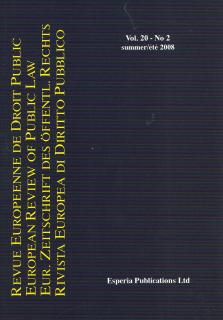
Administrative Law / Droit administratif
France
Professeur à l’Université de Paris I (Panthéon-Sorbonne)
This chronicle gives an account of the different important events which took place during the academic year 2007-2008. The administrative jurisprudence made progress in many respects. Thus, in the question of contract litigation, the administrative judge institutes a new legal remedy in favour of the third parties ousted in the conclusion of a contract, new remedy of full jurisdiction in the context of which it is being recognised especially important powers. Similarly, with regard to the internal measures, the Council of State clarifies its anterior jurisprudence born by the case Marie, by deciding that in order to know whether a category of decisions of the prison administration constitutes or not an internal measure, it is necessary to assess its nature as well as the importance of the effects of its decisions on the situation of the prisoners. However, the Council of State continues to apply classic solutions in order to determine, for example, the respective competences of the jurisdictional administrative order and of the jurisdictional order. A parliamentary authority permitting to ensure the information of the Parliament on the activity of the services specialised in intelligence, up to now non-existent, sees the light of day: the parliamentary delegation to intelligence. We assist in the pursuit of law simplification policy, a new law including very different fields in order to bring about amendments in law and authorise the government to adopt, again by means of an order, the legislative part of many codes. A first stage of a more extensive project of reform of the Council of State and of the administrative jurisdiction officially began, which from now on satisfies this imperative of assimilation of the requirements of fair trial set by the Court of Strasbourg, by carrying out a development in the organic separation of the two functions of the Council of State, and renovates the conditions of accomplishment by the Council of State of its advisory capacity.
La chronique rend compte de différents événements intervenus marquants au cours de l’année universitaire 2007-2008. La jurisprudence administrative a progressé à plusieurs égards. Ainsi, en matière de contentieux contractuel, le juge administratif institue une nouvelle voie de droit au profit des tiers évincés à la conclusion d’un contrat, nouveau recours de pleine juridiction dans le cadre duquel il se reconnaît des pouvoirs particulièrement importants. De même, s’agissant des mesures d’ordre intérieur, le Conseil d’Etat précise sa jurisprudence antérieure née de la solution Marie, en décidant que pour connaître si une catégorie de décisions de l’administration pénitentiaire est ou non constitutive d’une mesure d’ordre intérieur, il est nécessaire d’apprécier sa nature ainsi que l’importance des effets de ces décisions sur la situation des détenus. Mais le Conseil d’Etat continue à appliquer des solutions classiques pour déterminer, par exemple, les compétences respectives de l’ordre juridictionnel administratif et de l’ordre juridictionnel. Une instance parlementaire permettant d’assurer l’information du Parlement sur l’activité des services spécialisés en matière de renseignement, jusqu’alors inexistante, voit enfin le jour: la délégation parlementaire au renseignement. L’on assiste à une poursuite de la politique de simplification du droit, une nouvelle loi embrassant des champs très divers pour opérer des modifications du droit et autoriser le gouvernement à adopter, à nouveau par voie d’ordonnance, la partie législative de plusieurs codes. Une première étape d’un projet plus ample de réforme du Conseil d’Etat et de la juridiction administrative a été engagée par voie réglementaire, qui d’ores et déjà satisfait cet impératif d’assimilation des exigences du procès équitable imposées par la Cour de Strasbourg, procédant à un approfondissement de la séparation organique des deux fonctions du Conseil d’Etat, et rénove les conditions d’accomplissement par le Conseil d’Etat de sa fonction consultative.





















